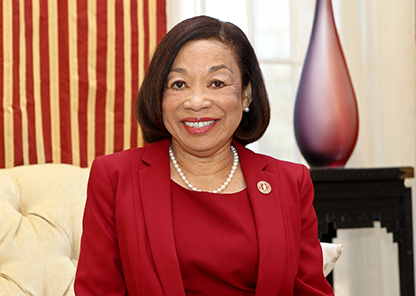Tuskegee University received its first competitive grant, from National Science Foundation under the COVID-19 Rapid Response Initiative. Dr. Crystal James, department head and director of the Graduate Program in Public Health in the College of Veterinary Medicine is leading the efforts of the grant as its principal investigator.
The project will focus on understanding the effects of disease prevention messages during the coronavirus epidemic and pandemic outbreaks; and how minority communities access and attend to these messages. The outcome of the project will implement culturally sensitive tools and materials, that promote disease prevention.
“The successful conclusion of this one year rapid response effort disease prevention strategies developed can be institutionalized by federal, state, and local agencies, as well as new data will be gathered on trust and trustworthiness in minority communities regionally,” explained James.
“These findings have the potential to positively affect the diversity of materials and decrease the levels of mistrust within minority communities across the deep south,” said James. “Results from this project will be disseminated in peer reviewed journals and at conferences as well as the materials produced by the project will be made available to practitioners and other researchers,” she continued.
The research is non-clinical in nature and involves a large-scale multi-state data collection using a newly constructed instrument to assess residents’ level of trust and fear related to disease transmission and where and how they prefer to receive information regarding prevention and treatment strategies.
“This is the first major grant provided to the Department of Graduate Public Health since its establishment in May of 2017,” noted James. “This pilot study will provide much needed resources to assist in the development of students as well as provide preliminary data for additional funding.”
Dr. Shaik Jeelani, vice president for research and dean of the Graduate School said the tireless support of the staff in the Offices of Compliance and Sponsored Programs and the IRB Committee must be acknowledged in winning this grant. “The development of this concept as well as the effort it has taken to collect, analyze, and report findings within one year is a testament to the amazingly dedicated team within the department, the College of Veterinary Medicine as well as the College of Arts & Sciences,” he explained.
Dr. Ruby Perry, dean of the College of Veterinary Medicine also added the data and information gained from this project will heighten awareness of how vulnerable populations attend to messaging from various sources regarding COVID-19.
“This project will ultimately provide evidence-base recommendations to federal, state, and local public health agencies for a different approach to help with decreasing health disparities in African American communities” said Perry.
At the project’s conclusion, health organizations will be provided with unique data on how minority communities access and attend to disease prevention messages during pandemic outbreaks. The grant will also address important concerns regarding trustworthiness that therefore often delay innovators to disease prevention methods amongst the African American community – thus, magnifying and/or delaying efforts to reduce and forestall increase morbidity and mortality among the study population.




